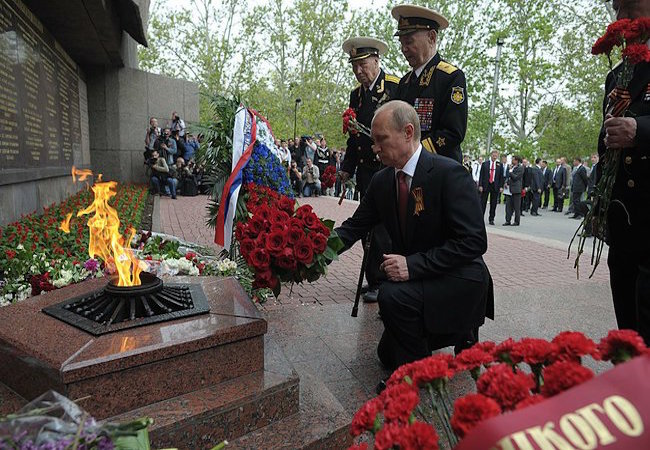
With Russo-Western relations plunging to new lows over the conflict in Ukraine, Russia continues its pivot East toward a new strategic partnership with North Korea. Recent efforts at closer bilateral cooperation reveal a Russian bid to project more power in its Pacific near abroad and further defy the West across the globe.
By Peter J. Marzalik
With Russo-Western relations plunging to new lows over the simmering conflict in eastern Ukraine, Russia continues its pivot East toward a new strategic partnership with North Korea. Recent efforts at closer bilateral cooperation in the political, economic, and military spheres reveal a Russian bid to project more power in its Pacific near abroad and further defy the West across the globe.
On 17 March, the Kremlin officially confirmed that North Korean leader Kim Jong-un will travel to Moscow in May, his first visit abroad since inheriting control after the passing of his father, Kim Jong-il, in 2011. Kim is one of 26 heads of state invited by Russian President Vladimir Putin to celebrate the 70th anniversary of the Soviet Union defeating Nazi Germany in World War II. With rumors swirling since December, speculation still abounds if the ruler of the reclusive nation will make such a publicized trip. Regardless, Putin can keep soaking up global attention to divert away from Western attempts to isolate him. His recent 10-day absence created a media frenzy that buried news on Russian-manufactured violations of the shaky ceasefire in eastern Ukraine.
“He likes these high-profile events,” explained Richard Weitz, Director of the Center for Political-Military Analysis at the Hudson Institute. “It’ll make him feel good. It’ll make him think that he’s still an important international leader.”
Some analysts agree that Putin’s invitation to Kim is largely an empty symbolic gesture. The May celebration represents an opportunity to flaunt his international prestige and showcase Russia’s global role. Putin’s visit to Cairo in January to announce the ascension of Egypt into the Eurasian Economic Union is one recent attempt. His latest move appears to be more Asia-focused. The presidents of China, India, and Vietnam plan to join the North Korean leader at the event as well. Furthermore, the appearance of Putin and Kim together, heads of two states targeted by economic sanctions, creates a provocative image of anti-Western solidarity. In blunter terms, it is another jab to the battered body of the West.
Others believe that there is a foreign policy of more substance in the works. “North Korea is a convenient friend for Moscow — it’s anti-American and it’s in a key place of Asia,” said Dr. Leonid Petrov, an Asian Studies professor at the Australian National University. “Russia lost many of its traditional allies — it needs friends, both economically, politically, strategically.”
A brief past review of Russo-North Korean relations and recent efforts at improved bilateral cooperation reveal that Kim’s visit to Moscow likely signifies more than just Putinesque political theater. Russia is making a concerted attempt to strengthen its influence in the Pacific.
It is not particularly surprising that Kim will have his first trip abroad as North Korean leader to Russia, instead of China. In the last few years, Pyongyang’s close relationship with Beijing has deteriorated mainly due to stronger Chinese opposition to the North Korean nuclear weapons program. North Korea and Russia share a long diplomatic history that rivals North Korea’s contemporary ally of necessity. Kim Il-sung, the revered founder of North Korea, served in the Soviet Army, receiving special military and political training in communist guerrilla tactics in the 1940s. During the Cold War, the Soviet Union became the primary benefactor of its eastern neighbor until 1991. Though China then filled the role of aid provider, the late Kim Jong-il still occasionally traveled to Moscow during his rule with the last visit a few months before his death in 2011. The Russian roots of modern-day North Korea should not be forgotten.
The widening gap in Chinese-North Korean relations offered a chance for Russia to advance its strategic presence in Asia even while embroiled in eastern Ukraine. It appears that Putin has seized the tactical initiative once again. In 2012, Russia first agreed to forgive 90% of North Korea’s Soviet era debt, a total worth of $10 billion, and reinvest a significant portion into energy, health care, and educational projects between the two countries. The deal was borne out last year with political promises transforming into closer economic cooperation.
In October, Russia announced a joint venture to reconstruct North Korea’s railroad system over the next 20 years in exchange for access to mineral resources. Other collaborations under review include shared advanced development zones to boost bilateral trade and a lucrative pipeline through North Korea to deliver Russian gas to South Korea, the world’s second biggest gas importer and closest Western ally in the region. Russia is clearly aiming to increase its influence in Asia, especially to exploit energy markets beyond Europe to keep the Russian economy afloat amid Western sanctions over Ukraine and the global drop in gas prices.
Russia’s political and economic charm offensive seems to be gaining ground. North Korea recently declared 2015 to be a special “year of friendship” with Russia. More notably, a Russian defense official released plans last month for joint military drills with North Korean forces, an ostensible counterpunch to annual U.S.-South Korea training exercises. Kim’s anticipated visit to Moscow is ultimately the diplomatic culmination of these recent improvements in the political, economic, and military spheres of Russo-North Korean relations.
In May, Putin will certainly capitalize on the pomp and circumstance of 26 heads of state celebrating Victory Day at the Kremlin, parading his relevance as a world leader. But amidst the political theater there will be machinations of substance with implications for the international security environment. The interactions between Kim, Putin, and Chinese President Xi Jinping will speak volumes on Russia’s ongoing efforts to project more power in its Pacific near abroad to the chagrin of Western interests.




